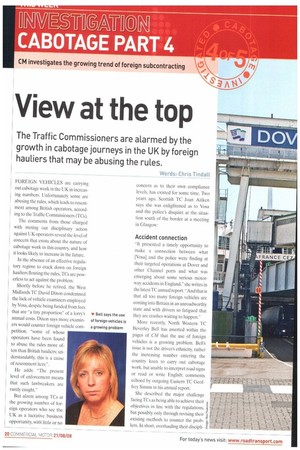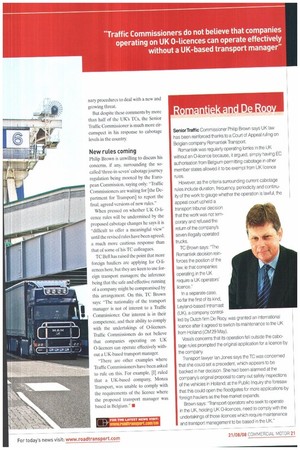View at the top
Page 20

Page 21

If you've noticed an error in this article please click here to report it so we can fix it.
The Traffic Commissioners are alarmed by the growth in cabotage journeys in the UK by foreign hauliers that may be abusing the rules.
Words: Chris Tindall FOREIGN VEHICLES are carrying out cabotage work in the UK in increasing numbers. Unfortunately some are abusing the rules, which leads to resentment among British operators, according to the Traffic Commissioners (TCs).
The comments from those charged with meting out disciplinary action against UK operators reveal the level of concern that exists about the nature of cabotage work in this country, and how it looks likely to increase in the future.
In the absence of an effective regulatory regime to crack down on foreign hauliers flouting the rules, TCs are powerless to act against the problem.
Shortly before he retired, the West Midlands TC David Dixon condemned the lack of vehicle examiners employed by Vosa, despite being funded from fees that are "a tiny proportion" of a lorry's annual costs. Dixon says more examiners would counter foreign vehicle competition, "some of whose operators have been found to abuse the rules more often than British hauliers; understandably, this is a cause of resentment here-.
He adds: "The present level of enforcement means that such lawbreakers are rarely caught."
But alarm among TCs at the growing number of foreign operators who see the UK as a lucrative business opportunity, with little or no concern as to their own compliance levels, has existed for some time. Two years ago, Scottish TC Joan Aitken says she was enlightened as to Vosa and the police's disquiet at the situation south of the border at a meeting in Glasgow:
Accident connection
it presented a timely opportunity to make a connection between what [Vosa] and the police were finding at their targeted operations at Dover and other Channel ports and what was emerging about some serious motorway accidents in England," she writes in the latest TC annual report. "And that is that all too many foreign vehicles are coming into Britain in an unroadworthy state and with drivers so fatigued that they are crashes waiting to happen."
More recently, North Western TC Beverley Bell has asserted within the pages of CM that the use of foreign vehicles is a growing problem. Bell's issue is not the driver's ethnicity, rather the increasing number entering the country keen to carry out cabotage work, but unable to interpret road signs or read or write English; comments echoed by outgoing Eastern TC Geoffrey Simms in his annual report.
She described the major challenge facing TCs as being able to achieve their objectives in line with the regulations. but possibly only through revising their existing methods to counter the problem, In short, overhauling their discipli nary procedures to deal with a new and growing threat.
But despite these comments by more than half of the UK's TCs, the Senior Traffic Commissioner is much more circumspect in his response to cabotage levels in the country
New rules coming
Philip Brown is unwilling to discuss his concerns, if any, surrounding the socalled 'three-in-seven' cabotage journey regulation being mooted by the European Commission, saying only: "Traffic Commissioners are waiting for [the Department for Transport] to report the final, agreed versions of new rules."
When pressed on whether UK 0-licence rules will be undermined by the proposed cabotage changes he says it is "difficult to offer a meaningful view" until the revised rules have been agreed; a much more cautious response than that of some of his TC colleagues.
TC Bell has raised the point that more foreign hauliers are applying for 0-licences here, but they are keen to use foreign transport managers; the inference being that the safe and effective running of a company might be compromised by this arrangement. On this, TC Brown says: "The nationality of the transport manager is not of interest to a Traffic Commissioner. Our interest is in their competence, and their ability to comply with the undertakings of 0-licences. Traffic Commissioners do not believe that companies operating on UK 0-licences can operate effectively without a UK-based transport manager.
"There are other examples where Traffic Commissioners have been asked to rule on this. For example, [I] ruled that a UK-based company, Monza Transport, was unable to comply with the requirements of the licence where the proposed transport manager was based in Belgium." •












































































































































































